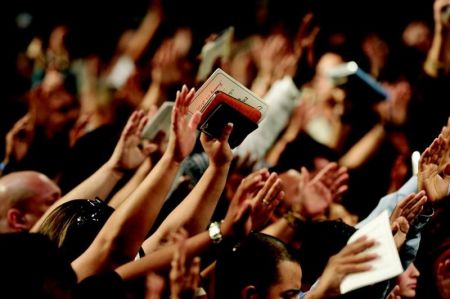Americans are turning away from church as population of Christians decline, Pew study claims

Only 65 percent of Americans now identify as Christian while those who identify as religiously unaffiliated swelled to 26 percent, a new study from the Pew Research Center says.
The new data, culled from telephone surveys conducted in 2018 and 2019, show a 12 percent decline in the number of Americans who identify as Christians when compared to the general population 10 years ago.
And the decline is visible across multiple demographics, particularly among young adults.
“The changes underway in the American religious landscape are broad-based. The Christian share of the population is down and religious ‘nones’ have grown across multiple demographic groups: white people, black people and Hispanics; men and women; in all regions of the country; and among college graduates and those with lower levels of educational attainment," Pew researchers says.
"Religious ‘nones’ are growing faster among Democrats than Republicans, though their ranks are swelling in both partisan coalitions,” Pew adds. “And although the religiously unaffiliated are on the rise among younger people and most groups of older adults, their growth is most pronounced among young adults.”
When it comes to rates of attendance at religious services, the share of Americans who say they attend religious services at least once or twice a month dropped by 7 percentage points, while the share who say they attend religious services less often, if at all, rose by the same figure.
“In 2009, regular worship attenders (those who attend religious services at least once or twice a month) outnumbered those who attend services only occasionally or not at all by a 52%-to-47% margin. Today those figures are reversed; more Americans now say they attend religious services a few times a year or less (54%) than say they attend at least monthly (45%),” researchers explain.
While the Protestant and Catholic churches have been experiencing losses in terms of their population share, all subsets of the religiously unaffiliated population have been experiencing growth in their numbers.
“Self-described atheists now account for 4% of U.S. adults, up modestly but significantly from 2% in 2009; agnostics make up 5% of U.S. adults, up from 3% a decade ago; and 17% of Americans now describe their religion as ‘nothing in particular,’ up from 12% in 2009. Members of non-Christian religions also have grown modestly as a share of the adult population,” Pew says.
The researchers collected their most recent data on the American religious landscape from random-digit-dial political polls encompassing 88 surveys from 2009 to 2019 that featured interviews with 168,890 Americans.
Respondents were asked questions about their age, race, educational attainment and other background characteristics. Each of the polls also included one basic question about religious identity such as: “What is your present religion, if any? Are you Protestant, Roman Catholic, Mormon, Orthodox such as Greek or Russian Orthodox, Jewish, Muslim, Buddhist, Hindu, atheist, agnostic, something else, or nothing in particular?”
Most of the polls also asked questions about religious attendance such as: “Aside from weddings and funerals, how often do you attend religious services? More than once a week, once a week, once or twice a month, a few times a year, seldom, or never?”
The results of the polls, Pew adds, show a wide gap between older Americans (Baby Boomers and members of the Silent Generation) and millennials in their levels of religious affiliation and attendance.
“More than eight-in-10 members of the Silent Generation (those born between 1928 and 1945) describe themselves as Christians (84%), as do three-quarters of Baby Boomers (76%). In stark contrast, only half of millennials (49%) describe themselves as Christians; four-in-10 are religious ‘nones,’ and one-in-10 millennials identify with non-Christian faiths,” Pew explains.
“Only about one-in-three millennials say they attend religious services at least once or twice a month. Roughly two-thirds of millennials (64%) attend worship services a few times a year or less often, including about four-in-10 who say they seldom or never go. Indeed, there are as many millennials who say they ‘never’ attend religious services (22%) as there are who say they go at least once a week (22%),” the researchers add.





















